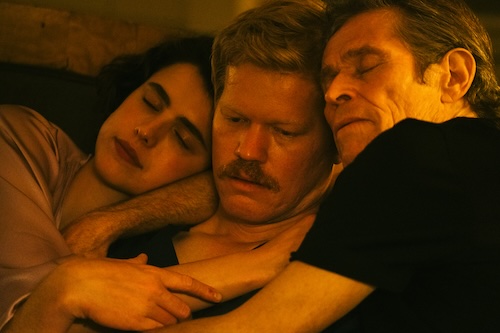
The twisted new black comedy Kinds of Kindness opens at Cineworld on June 28th. The film is a triptych of disturbing and mordantly funny tales and sports an all-star cast playing multiple roles. Oscar winner Emma Stone joins forces with Willem Dafoe, Jesse Plemons and Margaret Qualley, each delivering a bravely unhinged deep dive into the dark side of human nature.
The movie is directed by Greek filmmaker Yorgos Lanthimos who has previously helmed the darkly comic, misanthropic likes of The Lobster, The Killing of a Sacred Deer and The Favourite. More recently, he helmed the Oscar-winning smash Poor Things, which won Stone her second Academy Award.
Kinds of Kindness is clad in all of the director's hallmarks, which makes for a singular and memorable big-screen experience. But how do we define a Yorgos Lanthimos movie, and how is Kinds of Kindness so emblematic of his style?
Here are just a few examples, so hold on tight and expect things to get weird...
1. You won't know whether to laugh or to cry (and you'll likely end up doing both at the same time)
From the suicidal 'Biscuit Lady' in The Lobster to the pitiful yet hilarious pantomime spectacle of Olivia Colman's Queen Anne in The Favourite, there's no denying Lanthimos' ability to plumb uncomfortable resonances. He's a director who takes a uniquely absurdist view of the world and the people inhabiting it, often relying on poker-faced gallows humour that is played so straight as to deliberately confound an audience.
Poor Things also falls into this wheelhouse. The world of Stone's character Bella Baxter is an angular, future-retro Victorian steampunk mash-up distinguished by human and animal hybrids, maverick eccentric scientists and all manner of transgressive behaviour. As Bella rubs up against the conventions of the day, her sexual brazenness induces gasps of laughter and also elements of poignancy as she increasingly perceives the imbalance between men and women, rich and poor.
In Kinds of Kindness, the film's disquiet stems from its poker-faced absurdity, daring us to find the humour in appalling situations from marital strife to a man getting his own back on his overbearing boss. The film is the latest collaboration between Lanthimos and screenwriter Efthimis Filippou; they previously worked on Lanthimos' breakthrough movie Dogtooth (2009), not to mention The Lobster and The Killing of a Sacred Deer, and Kinds of Kindness marks a return to the darkly claustrophobic atmosphere inherent in those movies.
The consequences of each story are horrifying, but the intentionally stilted, almost artificial delivery of the lines, another Lanthimos signature, complicates our emotional response.
2. It showcases Lanthimos' muse Emma Stone
Lanthimos and Stone have only made three movies together but this collaboration has exerted a seismic creative impact in a very short time. They first worked together on 2019's The Favourite, a cracked chamber-piece comedy-drama about political and sexual in-fighting in the 18th-century court of Queen Anne.
Stone was a revelation as Abigail, the one-time aristocrat turned penniless servant who discovers a way to scheme her way into the ailing Anne's favours and thereby restore her family to success. Stone was Oscar-nominated for her role and it was little surprise that she reunited with Lanthimos for Poor Things.
As a director, he is capable of pushing Stone's usually genial screen image into fascinating new areas. Poor Things takes the boldness of Stone's performance in The Favourite and embellishes it with all manner of wondrous physicality: given that Bella's brain and human body aren't synced for most of the movie, it's almost like watching a live-action clockwork toy at play, and Stone brilliantly keeps these out-of-sync physical mannerisms consistent throughout the story.
That said, the real heart and soul of the piece lies not in what Bella does, brazen and taboo though it is, but in what she feels. Stone gives a remarkable turn as someone growing into a compassionate consciousness, playing an individual who increasingly perceives what is best for her but also for others. It adds emotive and resonant ballast to what is a very funny movie.
In Kinds of Kindness, Stone is arguably even more daring. She plays three different characters, each with a dark motive as the film probes sexuality, emancipation and identity with an unblinking gaze. Kinds of Kindness cements the Stone/Lanthimos partnership as one of the most dynamic in contemporary cinema.
3. Fish-eye lenses
Poor Things showcases arresting cinematography from the acclaimed DP Robbie Ryan who first worked with Lanthimos on The Favourite. The latter movie was distinguished by its assortment of unusual fish-eye lenses that caused a curve at the edges of the frame, which helped imbue the historical setting with a deliberate sense of unpredictability and anachronistic energy.
Lanthimos' fans will be delighted to learn that the signature fish-eye vistas make a comeback in Poor Things. As with The Favourite, it doesn't matter whether the approach is out of kilter with genteel historical backdrops, because it's that very cognitive dissonance that Lanthimos enjoys so much. As a director, he works with Ryan to forever unsettle us on both visual and thematic levels, never letting us settle into complacency but always challenging our expectations.
Although Kinds of Kindness takes place in the modern world, one that is appreciably more recognisable, rest assured that Lanthimos and returning cinematographer Robbie Ryan go all out to render it in bizarre and unsettling ways.
4. Offbeat musical decisions
Lanthimos often tracks in established pieces of classical music that play in dour, dirge-like contrast to his darkly comic set-ups. In The Lobster, extracts from Beethoven were set against Rachel Weisz's amusingly deadpan narration, crafting a deliberate sense of portentous that escalated the humour. The Favourite utilised scraping strings in the uncomfortable manner of a gout-ridden monarch shuffling their way across the floor, before culminating with Elton John's 'Skyline Pigeon'.
It's therefore apparent that Lanthimos favours an eclectic and diverse soundscape. Unusually for him, Poor Things does feature an original score from breakout composer Jerskin Fendrix, but given this is a Yorgos Lanthimos movie, don't expect the melodic highs of John Williams.
Instead, Fendrix's score keens and wails in the manner of a childlike consciousness that is butting heads with the cold, hard realities of the world. Occasionally, the score bursts into euphoric oddities of instrumental and synth disharmony, but Fendrix's work is most distinguished by its sheer weirdness. For that reason, it is the perfect companion piece to Bella's jaw-dropping, trail-blazing odyssey.
Fendrix returns to score Kinds of Kindness and once again a sense of experimentation is very much to the fore. The score intentionally grates on the nerves as it exposes the prickly black comedy and latent horror inherent in the narrative.
5. A bonkers dance sequence
In the course of just two movies, Lanthimos has established himself as the practitioner of the madcap dance sequence. In The Favourite, actors Rachel Weisz and Joe Alwyn engaged in a riotously OTT and anachronistic duet that is all the more hilarious for emerging out of nowhere. It occurs right in the midst of one of Queen Anne's balls and demonstrates how well Lanthimos can shatter our expectations at a moment's notice, obliterating any notion of this being a historical prestige piece and reinforcing the absurdist undercurrents of all the social climbers waiting on the long-suffering monarch.
You'll no doubt be aware that Poor Things boasts a hilarious dance sequence of its own. In this instance, it's not just a throwaway bit of comedy but an important act of liberation on Bella's part as she feels compelled to throw social conventions to the wind and enjoy herself amid a genteel dining room. The fact that she drags in Mark Ruffalo's Duncan Wedderburn is the icing on the cake: Stone and Ruffalo's contrasting styles, she all improvised madness, he controlling and jigging, only makes the scene more memorable.
In Kinds of Kindness, we're greeted with a twerking Emma Stone who is seemingly oblivious to the incapacitated person in a wheelchair behind her. We say seemingly – Stone's character has engineered this situation, which makes her out-of-context dance all the more ridiculous, hilarious and emotionally troubling.
6. Gorgeous design and costumes
One cannot deny that Lanthimos' movies are always a feast for the senses, even if what we're looking at is profoundly uncomfortable and often flat-out horrific. Both The Lobster and The Killing of a Sacred Deer had a clammy realist aesthetic with lots of grays and blues to signify a world in which passion and spontaneity are notable by their absence.
The Favourite utilised the interiors of the famous Jacobean building Hatfield House to craft pure visual and ASMR pleasure: a world of echoing footsteps, seemingly endless corridors, picture windows and cavernous galleries in which secrets can't remain hidden for very long. Robbie Ryan's unusual cinematography and Fiona Crombie's production design helped augment this sense of physical immersion, as did renowned costumer Sandy Powell's offbeat clothing choices (including the tricorn hat for Rachel Weisz's character Lady Sarah).
Lanthimos has swapped out several of his collaborators on Poor Things although Ryan's influence remains, transitioning from monochrome in Bella's 'childhood' years to bright, pastel-infused wonder as she sets off into the world and discovers more about herself. Poor Things was shot almost entirely on a soundstage in Hungary and there is a deliberately surrealist, Terry Gilliam-esque nature to Shona Heath and James Price's production design, particularly the teeming retro-future environment of an alternative Lisbon where the famous trams are now transported through the air on wires.
Holly Waddington's Oscar-winning costumes are another star of the show, evolving from gaudy madness to more subtle arrangements in harmony with the ever-evolving Bella's personality.
Kinds of Kindness has a contemporary setting so don't expect something quite so eye-widening. Nevertheless, the apparent normality of the outfits and locations serves to offset the weirdness of the character behaviour, reminding us that twisted neurosis constantly lurks in the fabric of banal day-to-day life.
7. It takes an uncompromising look at relationships
No matter the period, Lanthimos is renowned for taking the scalpel to messy human interactions, be they psychological or physical. The Lobster was a wholly original story that literalised the mating game, taking place in a dystopian future where people have to locate a suitable partner lest they be turned into an animal of their choice.
The Killing of a Sacred Deer exposed the cracks in the marriage between a surgeon and his wife, played by Colin Farrell and Nicole Kidman, as brought on by Barry Keoghan's sinister outsider. And The Favourite explored the fall-out in the court of Queen Anne as the monarch emotionally tussles with her two scheming attendants and lovers, Rachel Weisz's Lady Sarah and Emma Stone's Abigail.
Poor Things uses the central character of Bella to interrogate liberation and independence. As Bella intellectually matures and starts to outstrip the sleazy Duncan, he begins to lose control over someone he considers to be his personal plaything. The structure of Bella and Duncan's relationship is played for broad laughs, but underneath the comedy is a profoundly serious undercurrent that is designed to have us musing on the state of our own lives.
Kinds of Kindness is similarly forensic in its look at human relationships. One especially acute scene involves Stone's character attempting to initiate group sex while faced with the ambivalence of her husband, played by Jesse Plemons. Like everything else in the film, it's uncomfortable and outrageous at the same time.
8. There's a surreal atmosphere that often borders on horror
The Lobster may have used a farcical set-up, exploring what happens when humans turn into animals if they don't find a mate, but it eventually takes a dark turn into blindness and fascism. This uneasy divide between outrageous pantomime and sudden violence has earmarked not just The Lobster but all of Lanthimos' movies including his early hit Dogtooth, which explores the consequences of a family kept hidden from the outside world.
The Killing of a Sacred Deer is by far Lanthimos' darkest and most uncomfortable movie, beginning with an extended shot of open-heart surgery and culminating in a sacrificial game of violence that's designed to tear the very notion of a family apart. And although The Favourite induces humour via the delicious barbs shared between the main players, ultimately we're left disconsolate and unsettled by the self-destructive nature of all those on display.
Poor Things certainly treads into these darker areas, particularly in the later stages as Bella perceives the realities of female exploitation and how it is used as a money-making business. However, Poor Things is perhaps the most emotionally generous of all Lanthimos' movies as Bella's naivete at how the world works is transmuted into a desire to make it a better place. And for once in a Lanthimos movie, we believe it can happen.
Kinds of Kindness, like Poor Things, is rated 18 for frequent transgressive behaviour and disturbing images, much of which one would expect to find in a standard-issue horror movie. Of course, there's nothing standard-issue about the way that Lanthimos, his cast and crew view the world. They're out to put humanity under the microscope and if you've got the stomach for it, it's a hell of a ride.
Click the link below to book your tickets for Kinds of Kindness, which is released at Cineworld on June 28th.
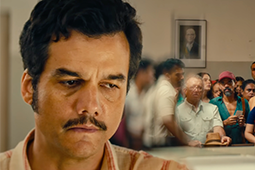
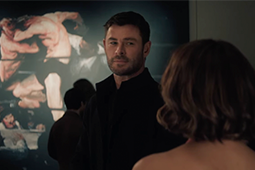

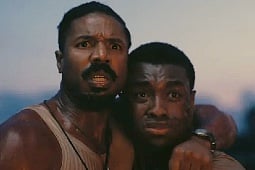
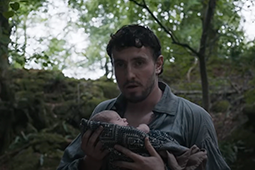

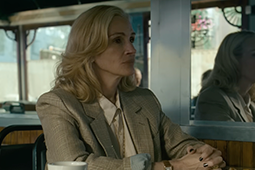
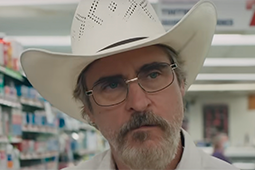


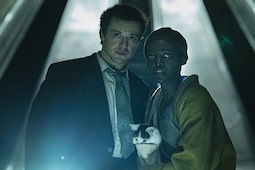


.jpg)
.png)






